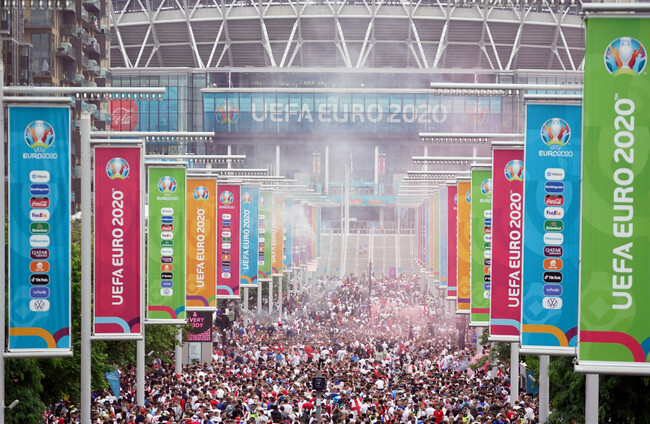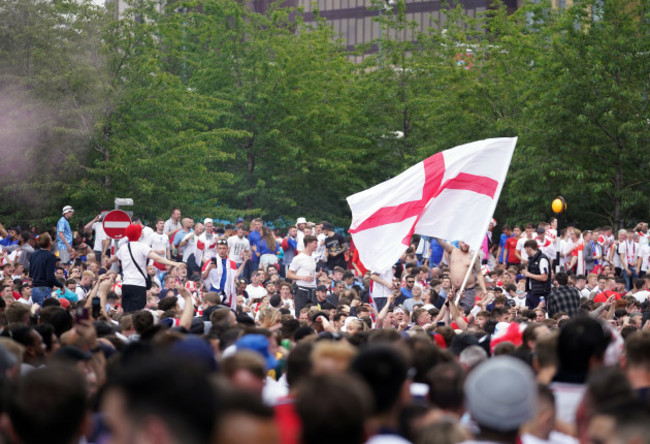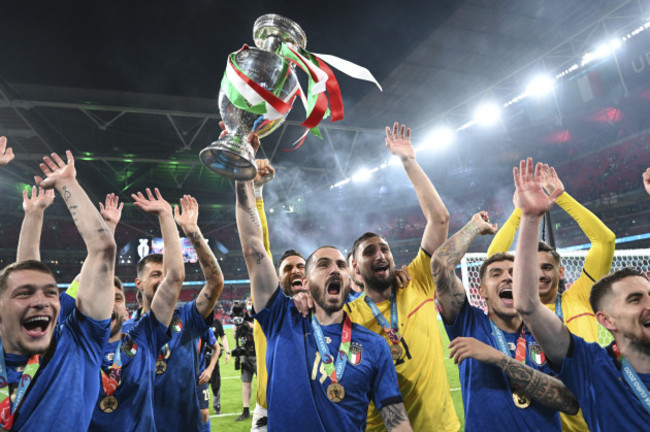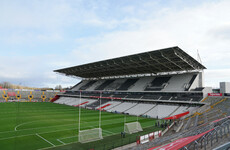ON THE one hand, it felt like a case of: ‘Nothing to see here.’
After reports of trouble began to emerge ahead of Sunday’s Euro 2020 final, a Wembley spokesperson was quoted by various media as saying: “We are dealing with an incident that occurred at the outer security perimeter area of the stadium, with support from police.
“Safety measures were quickly activated in the relevant areas and there were no security breaches of people without tickets getting inside the stadium.”
And from watching the BBC’s pre-match coverage of the big game, you got little sense of any serious issues occurring in or outside the stadium.
Yet some of the post-match reports began to paint a different picture of an altogether more toxic atmosphere than the joyous occasion portrayed by the television coverage.
“Maybe it was the sight of a fan in a wheelchair having his lanyard ripped off,” wrote Miguel Delaney in The Independent. “Maybe it was the sound of outright racist and xenophobic abuse, that are usually the cause for immediate removal from any English stadium. Maybe it was the poor young steward punched at Wembley Way. Maybe it was the openness of cocaine use in front of young kids.
“It was difficult to pick a worst moment around Wembley on Sunday but, either way, all were much more depressing than anything that happened on the pitch.
“Several England supporters who legitimately attended the Euro 2020 final have come forward to tell the Independent that they long ceased to care about the game, because they were so worried about everything going on around them. One family said they left after half an hour because their children were petrified.”
“Wembley had timed entry — friends of mine turned up to their seats at the appointed time and four dudes were sat there who refused to move,” journalist Gabriele Marcotti told Off the Ball. “What do you do in that situation? Go and complain to a steward on minimum wage in a little jacket, likely to be an 18 years old girl?
“What the Wembley stewards did was go and seat them in empty seats. At that point, social distancing goes out the window — and you have social distancing for a reason, England has the highest infection rate in the world right now.”
1. Last thoughts on Euro 2020, before I switch off. Here's the stand near me at Wembley yesterday. More people than seats, whole gangway filled with standing insurgents. The reason this bothered me: I've written about football security officials and what keeps them awake at night pic.twitter.com/2RZbv5te4i
— Simon Kuper (@KuperSimon) July 12, 2021
One man who witnessed it all up close was Brendan Fitzsimons, a teacher from Sligo, who was supporting Italy at the game along with his father.
Based in Ireland, he successfully applied for the tickets back in 2019, when he had no idea which two teams would be competing in the final.
Fitzsimons has been regularly attending Ireland home games since 2000 but never witnessed anything at an international match quite like the scenes at Wembley last weekend.
With kick-off set for 8pm, they arrived outside the stadium at 11.30am on matchday.
“We thought: ‘We’ll go in early, get all the things we need to get, merchandise, programmes and all that and we’ll kill time around the stadium, go get some food, drinks, whatever the case may be. We said the earlier we go, the better. The way the tickets worked, we were due to be going into the stadium at six o’clock. We had a [specific] time to go into the stadium to prevent all the crowd from going in at once.”
Wearing an Italian jersey, though replacing it with a Sligo Rovers top at various stages, Fitzsimons found himself “surrounded by English fans”.
“I did think going into it that there would be more Italian fans dotted around the stadium than there was, just because of the nature of it being a final, but there were absolutely none,” he says.
“There were probably a lot of people who got tickets in the same scenario as myself and dad.
“They obviously relinquished them when their team didn’t get to the final or they weren’t going to be able to travel.
“Just before we went into the stadium, I switched on the Italian top. I didn’t get any hassle bar one lad throwing a little dig at the elbow and making it known, but that was it really. During the match in the second half, you could kind of sense Italy were going to score. Most of the people around us were sound. There were a couple of people behind us who were making a few comments. I thought: ‘I’ll change this [jersey] now to be safe, particularly for getting out of the stadium.’”
He continues: “We said to each other early on, we can’t say or do anything. For the whole second half, we were nearly talking to each other in whispers. You’re conscious that you sound a little bit different and you don’t quite know who that might offend. We were very much keeping to ourselves. When Italy scored, we didn’t do anything. We just stood still.”
Initially, when Fitzsimons arrived at Wembley Way early in the day, the atmosphere was “pretty good-natured,” though it soon changed.
“You could see there were people arriving from the train station and going straight to the shop to buy slabs of cans. There was a queue of 20-30 people deep for each of these shops going in. Some were bringing cans on the train with them. We walked around the stadium to get our bearings and see where we had to go in. By the time we did that, the crowd had doubled in size. It was definitely way louder and more boisterous. At that stage, they had moved down to a pedestrian crossing. There was broken glass littering all the way and footballs flying around, no drinks at that stage, but cars were struggling to get through halfway down Wembley Way and it was starting at that stage.
“You could sense there was a little bit of not quite lawlessness, it got to that later on, but there was an atmosphere growing where it was going to be a bit manic.”
🚨⚽️ | NEW: England fans outside Wembley pic.twitter.com/RVERE6dcUw
— News For All (@NewsForAllUK) July 11, 2021
As the day progressed the scenes became rowdier and in some cases, genuinely distressing.
“We went out and got food and drink a few times and then came back. By that time there were a few thousand in front of Wembley Way, the smoke bombs and everything, we didn’t want to be in the middle of the crowd obviously. But I counted at least six people wandering around covered in blood. And no one really batted an eyelid.
“And even the conversations, we were wearing Sligo Rovers tops at this stage and some people might stop and ask what the jersey is. Then they hear the accent. The response was mostly positive, but there were a few guys saying: ‘What are you doing here? You’re supporting England.’ Not that you felt unsafe, but you’re very aware: ‘Make sure you say the right thing.’”
Despite the Wembley spokesperson’s statement to the contrary, it appears many people managed to get in without tickets.
There have been suggestions that as many as 15,000 individuals entered without tickets, while reports have indicated some fans bribed stewards in order to gain entry.
Deputy Assistant Commissioner Jane Connors claimed “police commanders deployed one of the most significant and comprehensive policing plans the Met has ever committed to a football match of this scale,” while the FA also defended the level of security at the stadium, however, these words do not tally with the accounts of many fans present on the day.
“You got past the first Covid checkpoint and we could see that was really nominal. There were two checkpoints — the Covid one going onto the concourse and you had to use your ticket, then, to get in through the turnstiles.
“Uefa had said to bring ID with your ticket and have your email from the NHS that says you tested negative. It was quite clear there were people walking in without having any tickets checked. You could see groups of people just walking by stewards. We walked around the stadium at maybe about three o’clock. We saw four guys trying to jump the fence. The stewards said ‘guys, don’t try that now, come back later when it’s quieter, you might get in then’. When I look back, there were a lot of incidents like that.
“We queued up at six o’clock for the Covid check and got in at that time. We spent about 10 minutes on the concourse, just looking down to see what was happening outside and I did see two guys try to push through a disabled gate into the stadium itself and a steward kind of fought them off. One guy got tackled by the police, he was handed to the stewards and just put back outside. He wasn’t arrested or anything. He was obviously one of the people that had jumped the Covid queue.”
Fitzsimons adds: “Outside the ground, the policing presence seemed really under-prepared and under-resourced. Dad and I had actually gone to see Leeds play Millwall 12 years ago in a play-off semi-final in Leeds. There were only 1,000 Millwall fans, but there were more police there than Millwall fans. They created a cordon. It was two sets of fans that really don’t like each other, but there was never any moment of trouble at that.
“But on Sunday, for the number of fans that were there, there was very little police and it looked to us like they were told to have a bit of a light touch. We wandered around and we were down beside one of the car parks. There were two police horses in the car park wandering around where there was no trouble while all the madness was going on inside.
“And then in the stadium itself, I could hear several people talking about stewards taking money at the gate to let people past the Covid check.
“Even in the stadium itself, they just seemed really under-prepared. At one stage, I asked one of the stewards where was the toilet was and he said: ‘I think it’s that way.’ Little things like that tell me it wasn’t the most well-organised event.
“It then took us about two hours or so to get home. We were thinking afterwards if England had won, we didn’t know how we would have gotten home. It actually would have been more chaotic outside after the match.”
Fitzsimons was situated in the stadium’s upper tier and he says it wasn’t particularly overcrowded in that area, but in relation to the lower tiers, explains: “I had an English-supporting friend at the match and he said it was jam-packed down there. He said a lot of people were worried that if England had scored or won it, they don’t know what could have happened.
“Another issue is we wore masks the whole time but we were probably the only people in our area wearing masks. I’d say 90% of the stadium was not wearing masks. A friend of mine would go to a lot of home and away England games. In his group chat of around 40-50 people that were at the match, he reckons all but two have tested positive for Covid.”
Moreover, in recent times, the sight of English fans behaving badly at major tournaments has become so commonplace that it is almost normalised and expected to a degree. Fitzsimons agrees that there appears to be a cultural problem in that regard.
“I lived in England for a couple of years myself and there are lots of brilliant people there, but you compare it to home, having gone to Ireland matches for the past 20 years, if you saw someone covered in blood, people would ask if they are okay, they would direct them somewhere, they would wonder what was going on. But [in England], it seemed to be accepted as the norm. There was a tone of aggression with the crowd there. To me, it seemed really strange how so many people wander around covered in blood and the police there don’t ask them are they okay.
“I remember one guy having an argument with a steward. He was talking about how some guy had been hit and they did nothing about it, and the guy was still in the stadium. There were lots of little things like that. It’s really alien to me that people just accept that.
“And even talking to people after the match, there’s this assumption that England didn’t get to a final for 55 years. ‘Lads are going to drink to excess, what’s the problem? Everyone does it.’ That’s the attitude, but everyone actually doesn’t do it. Other nations don’t do it. I know Irish fans are known for going abroad and having a very tempestuous relationship with alcohol, but when it comes to football fans, it’s much more good-natured in my experience anyway. I’ve been away for Sligo Rovers European matches and for tournaments involving Ireland and I’ve never experienced any trouble.
“But in England, it’s glossed over by the media where they give a free pass to these things and they kind of say: ‘What do you expect?’
“Even little things like Gareth Southgate talking about this fascination with World War II and the spirit of the war, it feeds into this sense of needless aggression. Even with the songs and stuff, there’s always this undertone of aggression for some reason. I’ve never experienced it with any other country in terms of football and it definitely feels like it’s given a bit of a free pass.”
And what needs to be done to prevent similar debacles from marring major events in the future?
“I think it comes down to education, coming at it with my teacher hat, and a lot of it comes down to who the government of the day is as well. There were a lot of factors at that match — Brexit and everything plays its part.
“The police presence and better preparation would help, but it’s a much bigger societal issue. That was kind of borne out not by what happened at the stadium but the messages that the players like Rashford and Saka received [after missing penalties]. That was aggression in another way that’s manifested itself. There are so many great fantastic people in England and it’s tough for them to be let down by those in a minority, but a relatively loud one.”













Celtic v Rangers Feb 1st.
Paint drying would be better craic..
The women’s world cup would be worth it only to see the comedy show Of bad goalkeeping. The first women’s teams to get a half decent keeper would win everything
Let me guess, you’re a man right??
Irish Open Golf 31 May…
Aus open 2015, Melbourne
Tour de France, Sat 25 July. L’Alpe d’Huez. Roche, Martin and Bennett! Over a million people on the mountain and it’s free. Some craic.
The masters in April to see Rory complete career slam